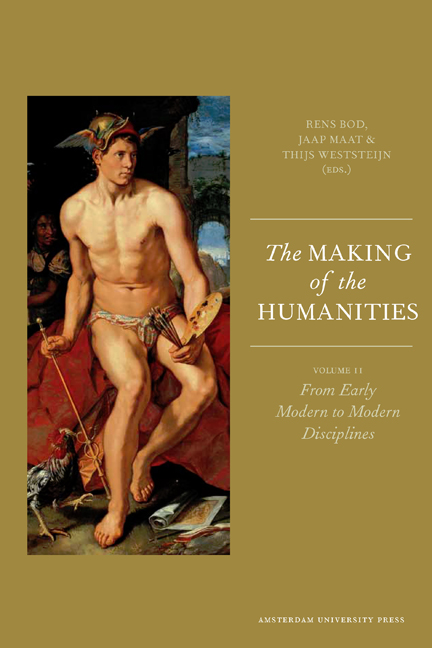Book contents
- Frontmatter
- Contents
- Introduction: The Dawn of the Modern Humanities
- I Linguistics and Philology
- II The Humanities and the Sciences
- III Writing History and Intellectual History
- IV The Impact of the East
- V Artworks and Texts
- VI Literature and Rhetoric
- VII Academic Communities
- Contributors
- List of Figures
- Index
The Humanities as the Stronghold of Freedom: John Milton’s Areopagitica and John Stuart Mill’s On Liberty
Published online by Cambridge University Press: 19 January 2021
- Frontmatter
- Contents
- Introduction: The Dawn of the Modern Humanities
- I Linguistics and Philology
- II The Humanities and the Sciences
- III Writing History and Intellectual History
- IV The Impact of the East
- V Artworks and Texts
- VI Literature and Rhetoric
- VII Academic Communities
- Contributors
- List of Figures
- Index
Summary
The concept of liberty goes back to classical Greece and Rome, and is closely linked to the humanistic revival of classical letters in the Renaissance. The problem of liberty, however, became more acute with the invention of the printing press, that lead to a diffusion of texts far wider than anything known to the classical or the medieval worlds. The sixteenth century, during which the new techniques of printing became widely established throughout Europe, also coincides with an increasingly rigorous exercise of censorship on the part of both the political and the ecclesiastical authorities of the time. It is also necessary to bear in mind the collapse of the Roman Catholic Church as the unique religious authority throughout Europe at precisely this time. The rise of fragmented and aggressively Protestant forms of Christianity in the north of Europe led to a new religious pluralism, but also to widespread forms of intolerance on the part of most, if not all, the religious authorities, both Catholic and Protestant, involved in often violent forms of conflict.
Further developments served to exasperate the problem of liberty from the sixteenth century onwards. One was the rise of the so-called Scientific Revolution that often, as in the case of the post-Copernican cosmology, defied orthodox readings of the Bible. Indeed, the exercise of biblical criticism itself had already been subjected to a radical upheaval by the new philological and historical investigations into biblical antiquity by Lorenzo Valla, which, after being developed in different directions by a series of major sixteenth-century scholars such as Erasmus of Rotterdam, Joseph Justus Scaliger and Giordano Bruno, would reach a dramatic climax in the works of Spinoza. Furthermore, the gradual development of new forms of parliamentary debate often questioned the traditional centres of both political and ecclesiastical power, which tended to react with severe forms of oppression. In this complex cultural environment of early modern Europe, a number of prestigious humanists assumed the task of defenders of liberty, putting their pens at the service of their communities in order to ensure that the citizens’ rights and liberties should not be completely erased.
- Type
- Chapter
- Information
- The Making of the HumanitiesVolume II: From Early Modern to Modern Disciplines, pp. 167 - 182Publisher: Amsterdam University PressPrint publication year: 2012
- 1
- Cited by



